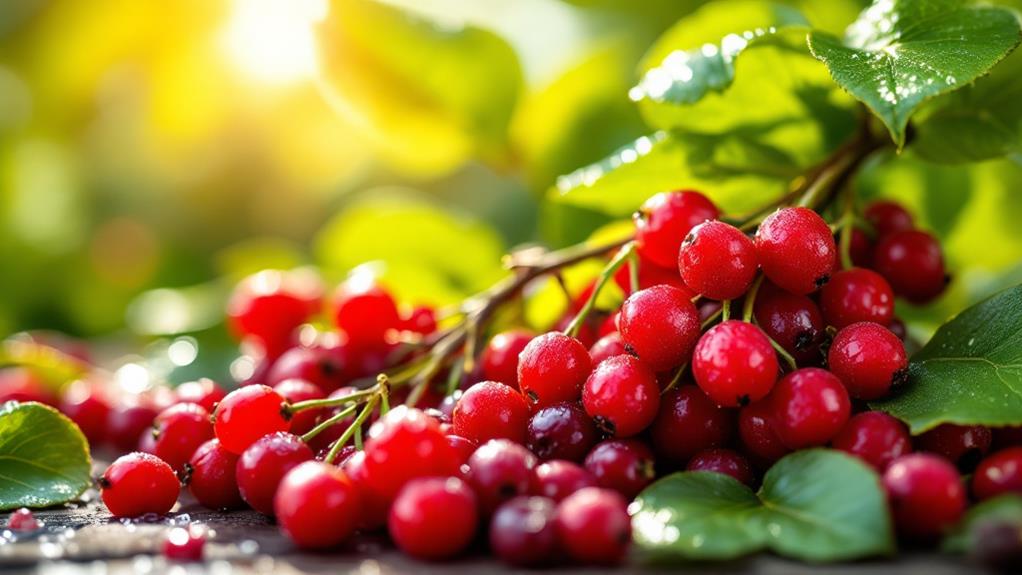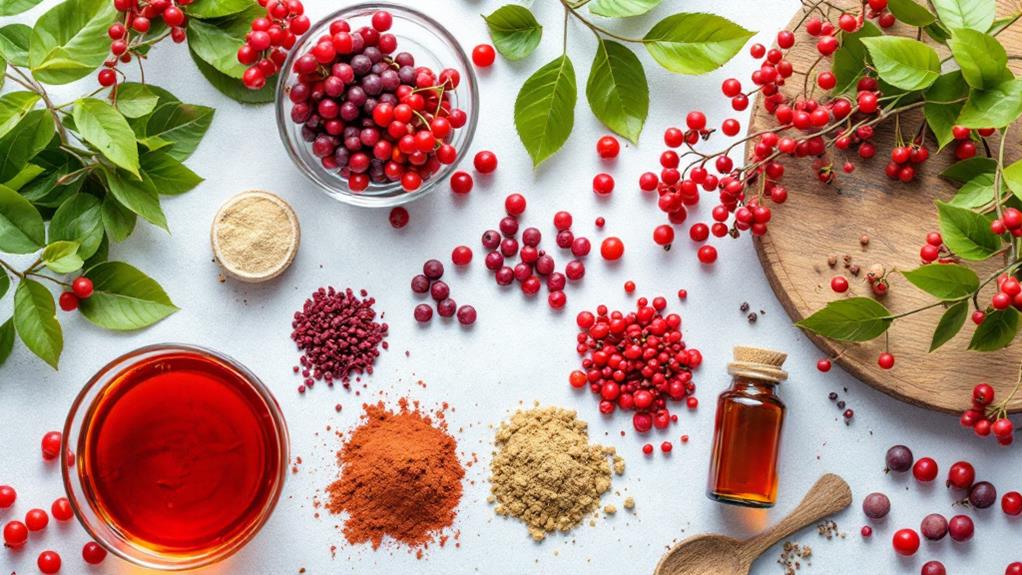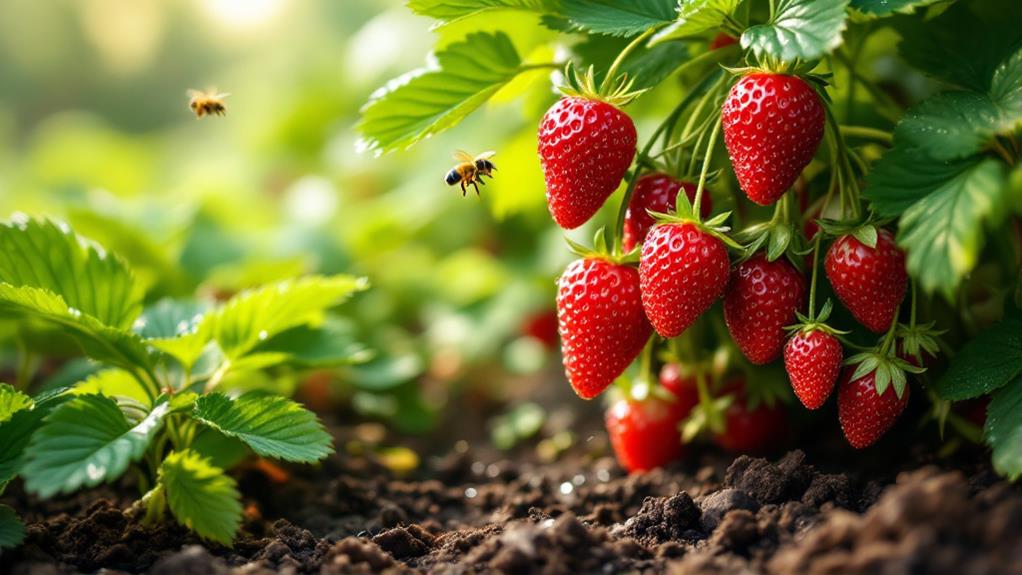Benefits of Schisandra Chinensis – The Power of Magnolia Berries
Uncover the power of Schisandra chinensis, a remarkable berry that elevates your health with its rich bioactive compounds. Packed with lignans, it offers potent antioxidant and anti-inflammatory benefits, helping reduce fatigue and addressing gastrointestinal and respiratory issues. Known for its adaptogenic properties, it improves cognitive function and helps manage stress. It supports liver health by promoting detoxification and regeneration. Schisandra also strengthens your immune system, aids in skin and cellular repair, and offers promising potential in cancer treatment. Transform your well-being with this traditional Chinese medicine staple, and there's so much more to reveal.
Magnolia Berry Overview
When you investigate the benefits of magnolia berries, you're diving into a tradition that values its bioactive compounds, particularly lignans, known for their antioxidant and anti-inflammatory effects. These properties contribute to Schisandra's reputation as a potential aid in managing fatigue, gastrointestinal and respiratory issues, and even in enhancing cognitive function. These uses reflect the fruit's revered status in traditional Chinese medicine.
Moreover, the adaptogenic properties of Schisandra make it an intriguing option for those looking to bolster their body's resilience against stress. As modern science begins to validate historical claims, magnolia berries continue to captivate interest for their potential health benefits, making them a compelling supplement to your wellness routine.
Key Active Compounds
Schisandra chinensis, known for its potent health benefits, owes much of its effectiveness to its key active compounds, particularly lignans like schisandrin A, B, and C. These lignans play a significant role in promoting wellness. Schisandrin B, for instance, is a standout due to its ability to induce apoptosis in cancer cells while maintaining lower toxicity levels in healthy cells compared to traditional chemotherapy drugs. This makes it a promising natural alternative in cancer treatment strategies.
Lignans in Schisandra chinensis also combat oxidative stress, protecting your cells from damage caused by free radicals. This is fundamental for maintaining cellular health and preventing different chronic diseases. Besides lignans, Schisandra is a wealth of other beneficial compounds:
- Fundamental amino acids: These support energy levels and enhance immune function.
- Polysaccharides: They contribute to total vitality by improving immune response.
- Rich minerals: Iron, manganese, and copper are essential for physiological processes.
- Schisandrin A, B, and C: These contribute to the plant's multifaceted health benefits.
Incorporating Schisandra chinensis into your routine could support your health in multiple ways, thanks to these potent compounds.
Antioxidant Properties

Renowned for its antioxidant prowess, Schisandra chinensis is packed with lignans, powerful bioactive compounds that help shield your cells from oxidative stress and free radical damage. These lignans are essential to the berry's antioxidant properties, combating harmful processes in your body. By inhibiting lipid peroxidation, Schisandra extracts prevent damage to cell membranes, a pivotal factor in the development of chronic diseases. This protective feature offers substantial health benefits, ensuring your cells remain intact and functional.
Moreover, Schisandra chinensis improves the activity of antioxidant enzymes, elevating your body's natural defenses against oxidative stress. This improvement is not just theoretical; research shows that Schisandrin B, a major lignan in Schisandra, actively scavenges free radicals. This makes it a vital ally in protecting your liver, heart, and brain tissues from damage.
Animal studies further support these findings, revealing Schisandra's potential to lower markers of oxidative stress, which underscores its role in promoting general health and longevity. By incorporating Schisandra into your wellness routine, you tap into its robust antioxidant properties, helping you maintain a healthier, more resilient body.
Liver Health Support
For those seeking to strengthen liver health, Schisandra chinensis offers promising support. This remarkable plant, rich in bioactive compounds, has been used for centuries in traditional Chinese medicine as a hepatoprotective agent. Schisandra chinensis' compounds, particularly Schisandrin C, have shown potent antioxidant effects that guard liver cells against damage, making it a significant ally in managing liver diseases like hepatitis.
Animal studies highlight Schisandrin B's ability to improve liver regeneration and function. This points to its therapeutic potential in liver health support, helping your liver recover and maintain its crucial roles in metabolism and detoxification.
Here are some key benefits of Schisandra chinensis for liver health:
- Antioxidant Protection: Schisandrin C reduces oxidative stress, protecting liver tissues from fibrosis and other conditions.
- Liver Regeneration: Schisandrin B supports the liver's natural regenerative abilities, aiding in recovery.
- Enzyme Modulation: Bioactive compounds modulate liver enzyme activity, improving detoxification processes.
- Traditional Use: Historically recognized as a hepatoprotective agent, promoting comprehensive liver vitality.
Cognitive Function Benefits

Beyond its benefits for liver health, this versatile plant also supports cognitive function. Schisandra chinensis can improve your cognitive abilities by increasing acetylcholine levels, a vital neurotransmitter for memory and learning. If you're looking to maintain sharp mental faculties, Schisandra might be your ally. Its key compound, Schisandrin B, has shown promising neuroprotective effects in animal studies. This means it could help slow down cognitive decline, keeping your mind sharper for longer.
Moreover, Schisandra's adaptogenic properties can improve mental clarity and focus. By potentially reducing fatigue-related cognitive impairment, you may find it easier to concentrate and stay alert throughout the day. This increase in mental energy is something many of us could use in our busy lives.
Research also highlights how Schisandra can improve antioxidant defenses in your brain. By protecting neurons from oxidative stress, it supports comprehensive brain health and longevity. This protective role is essential in maintaining cognitive function as you grow older. Historically, Schisandra has been valued in traditional medicine for increasing mental clarity and endurance. Today, it's gaining renewed attention for these very reasons, offering a natural way to support your brain's health.
Immune System Enhancement
In conjunction with its cognitive benefits, Schisandra chinensis is a powerful ally for your immune system. This remarkable berry is packed with antioxidants that protect immune cells from oxidative stress, elevating overall immune function. By incorporating Schisandra into your routine, you're harnessing a natural defense against infections, thanks to its impressive profile of bioactive compounds.
Here's how Schisandra improves your immune system:
- Antioxidants: These compounds shield your immune cells, ensuring they remain robust and effective.
- Lignans: Found in Schisandra, these boost immune cell activity, promoting a stronger response to threats.
- Polysaccharides: They stimulate white blood cell production, strengthening your body's natural defenses.
- Natural killer cells: Regular consumption increases their activity, essential for defending against tumors and viruses.
Schisandra's adaptogenic properties also play an important role in immune health. By helping regulate cortisol levels, it reduces stress-induced immune suppression, improving your resilience to illness. Studies suggest that the lignans in Schisandra may improve immune responses, making it a powerful tool for maintaining health. Welcome Schisandra as a natural way to fortify your immune system and keep sickness at bay.
Skin and Cellular Repair

Harnessing the power of Schisandra chinensis can greatly improve your skin and cellular repair processes. This remarkable berry is packed with antioxidants, which play an essential role in protecting your skin cells from oxidative stress and free radical damage. By doing so, Schisandra helps promote healthier, more resilient skin. The antioxidants work to maintain a youthful complexion, fighting off the visible effects of aging.
Schisandra also contains important amino acids that are vital for the repair and regeneration of skin tissue and cellular structures. These components guarantee that your skin remains supple and can effectively renew itself. Furthermore, the lignans in Schisandra have been shown to boost collagen production. Collagen is key to maintaining skin elasticity, helping to ward off wrinkles and sagging.
Additionally, Schisandra's anti-inflammatory properties can greatly reduce skin irritation and redness, resulting in a more even tone and texture. This not only improves your skin's appearance but also its overall health. The berry's ability to stimulate ATP production further enhances skin vitality and energy levels, leaving you with a radiant complexion. By integrating Schisandra into your routine, you can support your skin's natural repair and rejuvenation processes.
Potential Cancer Benefits
Amid growing interest in natural remedies, Schisandra chinensis emerges as a promising candidate in the domain of cancer research. The spotlight is on Schisandrin B, a key compound in this traditional Chinese herb. It's capturing attention for its potential anti-cancer properties, especially in inhibiting tumor growth within colon cancer cell lines. Researchers have observed that Schisandrin B induces apoptosis in these cells by triggering a stress response linked to protein misfolding. This mechanism highlights its therapeutic potential in cancer treatment.
What makes Schisandrin B particularly intriguing is its:
- Low toxicity levels: Compared to traditional cancer therapies, it poses less risk to healthy cells.
- Ongoing studies: Investigations, such as those by the Academy of Finland, are scrutinizing its anti-cancer capabilities.
- Questions in late-stage effectiveness: While promising, its impact on advanced colon cancer stages remains uncertain.
- Status as a safer alternative: Despite its potential, caution is advised due to the lack of established clinical evidence.
You should note that while Schisandrin B shows potential, it's essential to wait for more research before considering it a viable treatment option.
Forms and Consumption

When exploring the diverse ways to incorporate Schisandra chinensis into your routine, you'll find it available in several convenient forms. Regardless of your preference for the simplicity of dried berries or the versatility of powdered forms, there are consumption methods to suit every lifestyle. You can enjoy dried berries directly for their nutritional benefits or brew them into a soothing tea. For a seamless enhancement to your daily routine, powdered forms can be easily mixed into smoothies or health shakes, offering a quick uplift.
Capsules, extracts, elixirs, and juice provide supplementary options, each with recommended dosages clearly marked on their packaging to guarantee safe consumption levels. These products are often standardized to contain specific levels of bioactive compounds, such as lignans, which contribute to many of the health benefits associated with Schisandra chinensis. If you prefer a more natural approach, whole berries are readily available at health food stores, providing a straightforward way to integrate this fruit into your diet.
With such a wide array of consumption methods, you can tailor your use of Schisandra chinensis to fit your needs, making it an easy and beneficial enhancement to your wellness experience.
Safety and Side Effects
Schisandra chinensis, while celebrated for its potential health benefits, requires careful consideration regarding its safety and side effects. Although Schisandra is generally considered possibly safe for short-term use, typically up to 12 weeks, it may cause side effects like heartburn and an upset stomach in some individuals. It's vital to be aware of these potential reactions, as they highlight the need for caution, especially if you have a sensitive digestive system.
Here are some significant considerations:
- Common Side Effects: You might experience decreased appetite or itching, so monitor your body's response carefully.
- Long-term Safety: The long-term safety of Schisandra remains uncertain, so it's prudent to consult with a health care professional before extended use.
- Pregnancy and Breastfeeding: Pregnant women should avoid Schisandra due to the risk of uterine contractions. Breastfeeding mothers should seek guidance from a healthcare provider.
- Liver Conditions: If you have liver issues, exercise caution as Schisandra can interact with medications metabolized by the liver, particularly those involving the CYP3A4 enzyme.
Given these factors, consulting a health care professional is vital to guarantee Schisandra's safe and effective use, especially in the absence of thorough long-term safety data.




